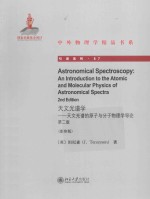图书介绍
天文光谱学 天文光谱的原子与分子物理学导论 第2版2025|PDF|Epub|mobi|kindle电子书版本百度云盘下载

- 赵春晖 著
- 出版社:
- ISBN:
- 出版时间:2014
- 标注页数:0页
- 文件大小:69MB
- 文件页数:237页
- 主题词:
PDF下载
下载说明
天文光谱学 天文光谱的原子与分子物理学导论 第2版PDF格式电子书版下载
下载的文件为RAR压缩包。需要使用解压软件进行解压得到PDF格式图书。建议使用BT下载工具Free Download Manager进行下载,简称FDM(免费,没有广告,支持多平台)。本站资源全部打包为BT种子。所以需要使用专业的BT下载软件进行下载。如BitComet qBittorrent uTorrent等BT下载工具。迅雷目前由于本站不是热门资源。不推荐使用!后期资源热门了。安装了迅雷也可以迅雷进行下载!
(文件页数 要大于 标注页数,上中下等多册电子书除外)
注意:本站所有压缩包均有解压码: 点击下载压缩包解压工具
图书目录
1.Why Record Spectra of Astronomical Objects?1
1.1 A Historical Introduction1
1.2 What One Can Learn from Studying Spectra3
2.TheNature of Spectra7
2.1 Transitions7
2.2 Absorption and Emission8
2.3 Other Measures of Transition Probabilities10
2.4 Stimulated Emission10
2.5 Optical Depth11
2.6 Critical Density12
2.7 Wavelength or Frequency?13
2.8 The Electromagnetic Spectrum14
3.Atomic Hydrogen17
3.1 Overview17
3.2 The Schr?dinger Equation of Hydrogen-Like Atoms17
3.3 Reduced Mass18
3.4 Atomic Units19
3.5 Wavefunctions for Hydrogen20
3.6 Energy Levels and Quantum Numbers21
3.7 H-Atom Discrete Spectra23
3.8 H-Atom Spectra in Different Locations29
3.8.1 Balmer series29
3.8.2 Lyman series33
3.8.3 Infrared lines35
3.9 H-Atom Continuum Spectra35
3.9.1 Processes35
3.9.2 H-atom emission in HⅡ regions36
3.10 Radio Recombination Lines38
3.11 Radio Recombination Lines for Other Atoms40
3.12 Angular Momentum Coupling in the Hydrogen Atom43
3.13 The Fine Structure of Hydrogen44
3.14 Hyperfine Structure in the H Atom45
3.15 Allowed Transitions46
3.16 Hydrogen in Nebulae47
4.Complex Atoms51
4.1 General Considerations51
4.2 Central Field Model52
4.3 Indistinguishable Particles54
4.4 Electron Configurations55
4.5 The Periodic Table56
4.6 Ions58
4.7 Angular Momentum in Complex Atoms59
4.7.1 L-S or Russell-Saunders coupling59
4.7.2 j-j coupling61
4.7.3 Why two coupling schemes?61
4.8 Spectroscopic Notation62
4.9 Parity of the Wavefunction63
4.10 Terms and Levels in Complex Atoms64
5.Helium Spectra69
5.1 He I and He II Spectra69
5.2 Selection Rules for Complex Atoms71
5.3 Observing Forbidden Lines74
5.4 Grotrian Diagrams75
5.5 Potential Felt by Electrons in Complex Atoms77
5.6 Emissions of Helium-Like Ions78
6.Alkali Atoms81
6.1 Sodium81
6.2 Spin-Orbit Interactions84
6.3 Fine Structure Transitions88
6.4 Astronomical Sodium Spectra89
6.5 Other Alkali Metal-Like Spectra93
7.Spectra of Nebulae99
7.1 Nebuliun100
7.2 The Bowen Mechanism104
7.3 Two Valence Electrons107
7.4 Autoionisation and Recombination109
8.Spectra in Magnetic Fields115
8.1 Uniform Magnetic Field116
8.2 Strong Magnetic Field117
8.3 Weak Magnetic Field118
8.3.1 The normal Zeeman effect118
8.3.2 The anomolous Zeeman effect119
8.4 Spectra in Magnetic Field120
9.X-Ray Spectra123
9.1 Inner Shell Processes123
9.2 The Solar Corona127
9.3 The Structure of Highly Ionised Atoms127
9.4 Isotope Effects131
10.Molecular Structure135
10.1 The Born-Oppenheimer Approximation136
10.2 Electronic Structure of Diatomics137
10.2.1 Labelling of electronic states140
10.2.2 Symmetry141
10.2.3 State labels143
10.3 Schr?dinger Equation144
10.3.1 Nuclear motion in diatomic molecules144
10.4 Fractionation149
10.5 Vibration-Rotation Energy Levels150
10.6 Temperature Effects152
10.6.1 Rotational state populations152
10.6.2 Vibrational state populations154
10.6.3 Electronic state populations155
11.Rotational Spectra157
11.1 Rotational Structure of Polyatomic Molecules157
11.2 SelectionRules:Pure Rotational Transitions160
11.3 Selection Rules161
11.4 Isotope Effects166
11.5 Rotational Spectra of Other Molecules166
11.6 Rotational Spectra of Molecular Hydrogen170
11.7 Maser Emissions170
12.Vlibration-Rotation Spectra175
12.1 Vlibrations in Polyatomic Molecules175
12.2 Vibrational Transitions177
12.2.1 Structure of the spectrum178
12.2.2 Isotope effects181
12.2.3 Hydrogen molecule vibrational spectra181
12.3 Astronomical Spectra183
13.Electronic Spectra of Diatomic Molecules187
13.1 Electronic Transitions187
13.2 Selection Rules188
13.2.1 Vibrational selection rules189
13.2.2 Rotational selection rules190
13.3 Transition Frequencies192
13.4 Astronomical Spectra193
13.5 Non-1∑ Electronic States195
Solutions to Model Problems199
Further Reading and Bibliography215
Index217
热门推荐
- 491167.html
- 3338581.html
- 3254430.html
- 3771073.html
- 2180578.html
- 3083334.html
- 3300423.html
- 3312805.html
- 1204063.html
- 3072036.html
- http://www.ickdjs.cc/book_2855600.html
- http://www.ickdjs.cc/book_3237631.html
- http://www.ickdjs.cc/book_2297307.html
- http://www.ickdjs.cc/book_1416034.html
- http://www.ickdjs.cc/book_2965524.html
- http://www.ickdjs.cc/book_893966.html
- http://www.ickdjs.cc/book_715968.html
- http://www.ickdjs.cc/book_2541886.html
- http://www.ickdjs.cc/book_3614676.html
- http://www.ickdjs.cc/book_569229.html